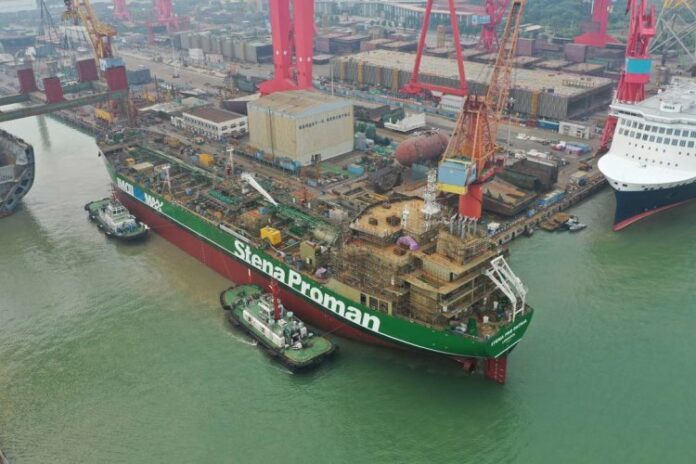Shipping joint venture Proman Stena Bulk has launched the Stena Pro Patria, the first of three 49,900 dwt methanol dual-fuel MR tankers that Proman and Stena Bulk are building together as part of their joint venture.
The launching is one of the most important milestones of the ship construction process, as the newly constructed vessel is transferred to the water for the first time. Stena Pro Patria’s launching took place at Guangzhou Shipyard International (GSI), which is the first Chinese shipyard to build a Methanol Dual-Fuel vessel.
Construction of the Stena Pro Patria will now continue on the water, ahead of sea trials and final delivery to Proman Stena Bulk in Q1 2022.
Over the next two years, it will be joined by another five methanol-powered newbuilds: Stena Pro Mare and Stena Prosperous, which will be Proman Stena Bulk JV vessels, and Proman-owned Provident, Progressive and Promise. All vessels will be constructed at Guangzhou Shipyard International and delivered by the end of 2023.
All Proman and Proman Stena JV vessels will utilise the same pioneering vessel design and innovative MAN B&W 6G50ME-C9.6 MW Tier III engines. The vessels will also be equipped with the latest energy efficiency technologies, including continually controlled combustion, optimised tuning, redesigned and aerodynamic hull lines, and an energy shaft generator, reducing fuel consumption and helping to meet strict emissions criteria.
Each vessel will use approximately 12,500 tonnes per annum of methanol as a marine fuel. Using widely available and cost-competitive ‘grey’ methanol produced from natural gas, greenhouse gas (GHG) emissions resulting from the vessels’ normal commercial operations will be significantly reduced compared to conventional marine fuels. This includes the virtual elimination of sulphur dioxide and particulate matter, a 60% reduction in nitrogen oxide and a cut in carbon dioxide, offering immediate improvements to air quality around ports and coastlines.



